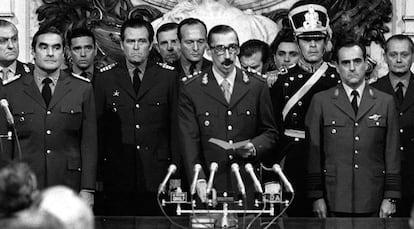Dispute over official figures from ‘Dirty War’ draws ire in Argentina
The official number of missing is 30,000 but some claim it could be closer to 9,000

Human rights issues have always been sensitive subjects in Argentina, a country that was governed by a cruel dictatorship (1976-1983) that carried out thousands of executions, kidnappings of babies, and other atrocities. During the past 12 years, the leftist governments of President Néstor Kirchner and his wife Cristina Fernández de Kirchner sided with the victims by continuously denouncing the military abuses that took place. The new conservative government of President Mauricio Macri has promised to carry on with the same policy, but many “Kirchnerites” don’t believe him, and each day there seems to be a new controversy that arises related to Argentina’s dark past. The latest row centers on the exact number of victims who actually disappeared during the military’s so-called “Dirty War.”

“In Argentina, 30,000 people didn’t go missing. That figure was negotiated on a bargaining table,” said Dario Lopérfido, a close aide to Macri who serves as culture chief for the city of Buenos Aires and is the director of the famous opera house Teatro Colón.
Lopérfido said that he has based his information on research carried out by Graciela Fernández Meijide, a well-known politician and director of a human rights organization, and whose son also disappeared during the Dirty War.
Fernández Meijide estimates that the figure is closer to 9,000.
“We are still receiving complaints about grandchildren who were born in captivity because more people are willing to come forward and tell the truth”
International human rights organizations have always used 30,000 as the official number but new questions on how many people actually disappeared have ignited a national debate.
Jorge Videla, the late dictator who overthrew the Peronist government in 1976, always maintained that about 8,000 people were victims, but nobody believed him.
Estela de Carlotto, one of the directors of the Grandmothers of the Plaza de Mayo – an association that searches for stolen children from the era – said she is upset by all the questioning.
“We have put the number at 30,000 because those who committed genocide actually killed 45,000. We are still receiving complaints about grandchildren who were born in captivity because more people are willing to come forward and tell the truth. Fudging with figures is an evil thing,” she said.
The government has been trying to play down the controversy because it fears that it can only serve to revive the bias that surfaced in many leftist sectors against Macri during last year’s election campaign.
“The issue about the disappeared should be treated cautiously. The government doesn’t want to ignite a row over the numbers”
Macri has always been seen as an ultra-right conservative but, with the help of political advisors, he was able to soften his image and go on to win the presidential elections.
Marcos Peña, one of his closest aides, met on Wednesday with De Carlotto at the Casa Rosada presidential palace. The head of the Grandmothers of the Plaza de Mayo has been close to the Kirchners and very critical of Macri. The president didn’t meet with her, but the invitation to Casa Rosada demonstrated Macri’s gesture to encourage dialogue.
“The numbers aren’t important,” said Claudio Avruj, Macri’s human rights secretary, in an interview with EL PAÍS. “The figure 30,000 is the number established by society and it is symbolic.
“It is true that CONADEP [the National Commission for Missing Persons] has referred to 9,000 but there are still a lot of pending trials. The issue about the disappeared should be treated cautiously. The government doesn’t want to ignite a row over the numbers,” Avruj said.
English version by Martin Delfín.
Tu suscripción se está usando en otro dispositivo
¿Quieres añadir otro usuario a tu suscripción?
Si continúas leyendo en este dispositivo, no se podrá leer en el otro.
FlechaTu suscripción se está usando en otro dispositivo y solo puedes acceder a EL PAÍS desde un dispositivo a la vez.
Si quieres compartir tu cuenta, cambia tu suscripción a la modalidad Premium, así podrás añadir otro usuario. Cada uno accederá con su propia cuenta de email, lo que os permitirá personalizar vuestra experiencia en EL PAÍS.
¿Tienes una suscripción de empresa? Accede aquí para contratar más cuentas.
En el caso de no saber quién está usando tu cuenta, te recomendamos cambiar tu contraseña aquí.
Si decides continuar compartiendo tu cuenta, este mensaje se mostrará en tu dispositivo y en el de la otra persona que está usando tu cuenta de forma indefinida, afectando a tu experiencia de lectura. Puedes consultar aquí los términos y condiciones de la suscripción digital.








































